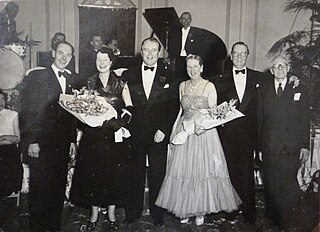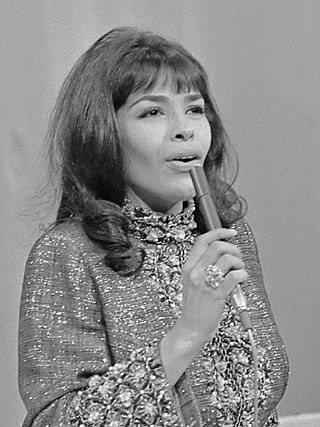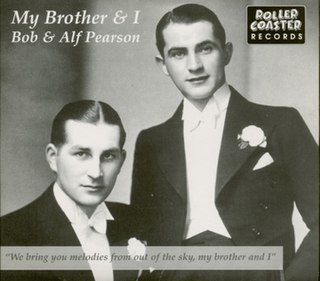
Jack Warner, OBE was a British actor. He is closely associated with the role of PC George Dixon, which he played in the 1950 film The Blue Lamp and later in the television series Dixon of Dock Green from 1955 until 1976, but he was also for some years one of Britain's most popular film stars.

Music hall is a type of British theatrical entertainment that was most popular from the early Victorian era, beginning around 1850, through the Great War. It faded away after 1918 as the halls rebranded their entertainment as variety. Perceptions of a distinction in Britain between bold and scandalous music hall entertainment and subsequent, more respectable variety entertainment differ. Music hall involved a mixture of popular songs, comedy, speciality acts, and variety entertainment. The term is derived from a type of theatre or venue in which such entertainment took place. In North America vaudeville was in some ways analogous to British music hall, featuring rousing songs and comic acts.
Variety show, also known as variety arts or variety entertainment, is entertainment made up of a variety of acts including musical performances, sketch comedy, magic, acrobatics, juggling, and ventriloquism. It is normally introduced by a compère or host. The variety format made its way from the Victorian era stage in Britain and America to radio and then television. Variety shows were a staple of English language television from the late 1940s into the 1980s.
Waters is a surname, derived from "Wat", or "Wa'ter", an old pronunciation of Gaultier or Walter, and similarly derived from the surname Watson. The name is common from an early date in Wales and Yorkshire, as well as Shropshire, England. P. H. Reaney, co author of the book A Dictionary of English Surnames, said “water was the normal medieval pronunciation of Walter. Theobald Walter is also called Theobaldus filius Walteri, Theobaldus Walteri and Tebaut Water in the Feet of Fines for Lancashire 1212-1236.”
Workers' Playtime was a British radio variety programme transmitted by the BBC between 1941 and 1964. Originally intended as a morale-booster for industrial workers in Britain during World War II, the programme was broadcast at lunchtime, three times a week, live from a factory canteen "somewhere in Britain". Initially, it was broadcast simultaneously on both the BBC Home Service and Forces Programme, then from 1957 onwards solely on the Light Programme. For all its 23 years each show concluded with the words from the show's producer, Bill Gates: "Good luck, all workers!"
David Freeman was a British film and television writer, working chiefly in comedy.

The Three X Sisters were an American all-girl harmony singing trio initially known as The Hamilton Sisters and Fordyce. They were on stage singing together in New York City, on Broadway, as early as 1922 and formed their trio in 1924, which was composed of Pearl Santos and Violet Hamilton from Cumberland, Maryland, and Jessie Fordyce from Brooklyn, New York. They were known on NBC radio as "radio's foremost harmony trio".

Toni Lamond AM, is an Australian vaudevillian, cabaret performer, singer, actress, dancer, comedian, writer and television and radio personality/presenter. She has had a successful career spanning some 80 years, both locally and internationally, including in the United Kingdom and United States.

Gladys Mabel Morgan was a Welsh comedian, billed variously as the 'Queen of Comedy' or 'the Queen of Laughter', and was renowned for her toothless, ear-splitting, infectious laugh.

Wilma Reading is a singer from Cairns, Queensland, Australia.

The Dinning Sisters were an American sisters singing group, active from the late 1930s to 1955. They made a handful of film appearances and had several hit records at the height of their popularity in the late 1940s.

It's in the Bag is a 1944 British comedy film directed by Herbert Mason and starring Elsie Waters, Doris Waters and Ernest Butcher. It was produced and distributed by Butcher's Film Service. Gert and Daisy try to recover a valuable lost dress.
Gert and Daisy is a 1959 British television sitcom. Starring the comedy act of the same name, the series aired on ITV, and was produced by Jack Hylton Productions for Associated-Rediffusion Television. The series aired for six episodes. Created by Ted Willis, who also created Jack Warner's Dixon of Dock Green series, Gert and Daisy was not successful, apparently because it relied on scripts written by others rather than on the sisters' own writing skills. All the episodes still exist but the series has yet to appear on home video.

Bob and Alf Pearson were an English musical variety double act, consisting of brothers Robert Alexander Pearson and Alfred Vernon Pearson, who were mainly known for their singing of songs as a duo in close-harmony. Their career together lasted over 50 years, spanning stage, radio, television and gramophone records.
Gert and Daisy Clean Up is a 1942 British comedy film directed by Maclean Rogers and starring Elsie Waters, Doris Waters and Iris Vandeleur.

Gert and Daisy's Weekend is a 1942 British comedy film directed by Maclean Rogers and starring Elsie Waters, Doris Waters and Iris Vandeleur. It was written by Kathleen Butler, H. F. Maltby and Rogers.
This is a list of events from British radio in 1930.

Reginald Arthur Dixon, always known professionally as Reg Dixon to distinguish him from the ballroom organist, was a British comedian, best known for his appearances on stage and radio.

Dorothy Isabel May Foster was an Australian radio producer, comedy scriptwriter and actress. She created the characters of "Ada and Elsie" during WW2.












